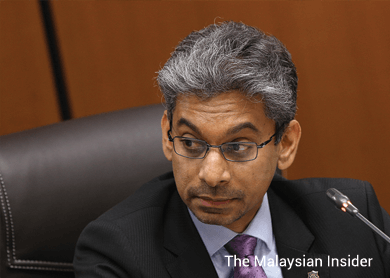
KUALA LUMPUR (June 8): Expressing concern over attempts by certain parties to ignore or reject entrenched principles in the Federal Constitution, the Malaysian Bar today called on all parties to adhere to the constitution.
Referring to Minister in the Prime Minister’s Department Datuk Seri Jamil Khir Baharom’s recent statement that the laws to ban unilateral conversion contravenes Article 12(4) of the Federal Constitution, Bar president Steven Thiru claimed the minister’s remarks are erroneous.
“The minister apparently relied on the Federal Court’s decision in the case of Subashini Rajasingam v Saravanan Thangathoray, but regrettably, his understanding of the case is flawed.
“There was no binding judicial pronouncement in that case on the meaning of the word ‘parent’ in Article 12(4) of the Federal Constitution,” he said in a statement.
Thiru said Article 12(4) must be read with the interpretation provisions in the Federal Constitution — Article 160 and the Eleventh Schedule — which provide that all words in the singular also include the plural.
Hence, he said, the religion of children under the age of 18 is to be decided by both parents, where both parents are alive.
Meanwhile, Thiru also commented on PAS president Datuk Seri Haji Abdul Hadi Awang’s Private Member’s Bill to amend the Syariah Courts (Criminal Jurisdiction) Act 1965 (or Act 355), saying it is “disingenuous for some quarters to suggest that the Bill does not touch upon hudud offences in any manner”.
He said the new Section 2 of Act 355 appears to widen the scope of the criminal jurisdiction of Syariah Courts beyond “offences against precepts of the religion of Islam by persons professing that religion, which may be prescribed under any written law”, which is in the existing Section 2.
“It is uncertain whether this is intended to be the platform to confer jurisdiction on Syariah Courts in respect of State enactments, such as the Syariah Criminal Code (II) (1993) 2015 Enactment (Kelantan), which prescribes hudud offences — the class of crimes prescribed under Syariah law — in its Section 5.
“The proposed amended Section 2, however, does not abide by the irrefutable legal principle that legislative amendments concerning criminal offences must be clear and precise, and must comply with constitutional limitations on the jurisdiction of the courts,” said Thiru.
The Bar president noted that the second amendment in the Bill is to introduce a new Section 2A with the objective of increasing the Syariah Court’s power to pass sentences.
“No sentence of death can be imposed under the new Section 2A, but the amendment would appear to confer Syariah Courts with unlimited power to impose all other hudud punishments.
“In this regard, offences such as zina (adultery), qazaf (false accusation of committing zina), syrub (alcohol consumption) and irtidad or riddah (apostasy) are all defined as hudud offences in Section 5 of the Syariah Criminal Code (II) (1993) 2015 Enactment (Kelantan), and carry the punishment of whipping ranging from 40 to 100 lashes,” he said.
Thiru said Article 8 of the Federal Constitution requires that all legislative action satisfy the test of proportionality.
“As such, a proposed statutory provision must be objectively fair, and proportionate to the object sought to be achieved by the Legislature.
“Legislative action that leads to arbitrariness or allows for excessive measures would fail this test of proportionality,” he said.
“It is improbable that the open-ended and unrestricted (save for the death penalty) sentencing power that Section 2A purports to confer on Syariah Courts will meet the proportionality requirement, thus rendering the constitutionality of Section 2A questionable,” he added.
Thiru said the Malaysian Bar strongly urges all parties to adhere to and uphold the Federal Constitution, and to refrain from provocative rhetoric.